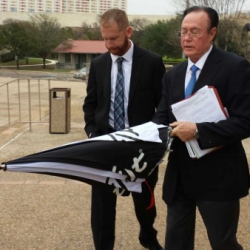Bexar Waste Employeee Michael Dennehy pleaded guilty to embezzling $1.7 million from the company. He admitted to spending most of that money on gambling and escorts. Mr. Dennehy pleaded guilty to one charge of embezzlement.
According to the documents, Michael Dennehy forged multiple company checks over a 6-year period. Alan Brown, attorney for Mr. Dennehy, said his client succumbed to urges he could not control. The lawyer also pointed out that Michael Dennehy is a married man and a father of 5.
Spent Embezzled Funds on Gambling
Alan Brown told My San Antonio, “He did spend it on gambling and on escort services, as the (feds) allege. I think those are big addictions. He feels remorse and wants to make amends for it.”
Dennehy decided to take a plea bargain agreement after the FBI confronted him with photographs of the forged documents, along with explicit photos of his torrid misconduct. When he goes before Senior U.S. District Judge David Alan Ezra for sentencing on March 9, Michael Dennehy faces up to 30 years in prison.
Dennehy’s Career with Bexar Waste
The FBI documents show that Dennehy was hired by Bexar Waste in 2004 as a truck stocker and recycler. In 2008, he was promoted into a position managing “accounts payable”. From this time forward, it appears that Michael Dennehy began to embezzle funds.
The FBI affidavit indicates he began making non-salary payments to himself between $1,200 and $1,800. These checks would be deposited into his personal bank account. At the same time, he would write company checks to pay his American Express bill.
Conduct Became More Brazen
As time passed, Michael Dennehy began to embezzle larger sums of money. To hide his misconduct, he used a stamp to forge authorized signatures on the checks. Then he changed the name of the payees in Quickbooks to hide the fact he was the one being paid.
This deception continued for several years, until it was finally discovered in August 2014. When Dennehy is sentenced on March 9, it’s likely he’ll be ordered to pay restitution. Currently, he works as a self-employed house cleaner, so he’s not likely to have the money to make restitution.
Dennehy Trying to Make Amends
Alan Brown told the newspaper his client is trying to make amends, but this effort is likely to come up short. Brown said, “He’s trying his best, but it’s hard to get back what you spent at casinos and (on) women.”
Dennehy’s spending spree eclipses that of Todd C. Seward, the comptroller who spent $400,000 of embezzled funds on strippers. On November 19, Seward pleaded guilty to similar charges.
Gambling Activities
Bexar Waste is located in Schertz, Texas, which is found in the San Antonio-New Braunfels metropolitan area. Schertz has a population just under 35,000. It is uncertain where Dennehy’s gambling activities took place. Given the lack of land-based casinos in the area around San Antonio–and it’s great distance from any bordering states–it’s likely Dennehy’s gambling took place at online gaming websites.
The FBI appear to have focused more on Dennehy’s used of paid escorts. It was photo evidence of this activity which seems to have convinced the married man to make the plea agreement. It is uncertain how lenient the judge in the case will be, given Michael Dennehy does not appear to have a prior arrest record. At the same time, the record shows a clear 6-year period of malfeasance.
Similar Cases Nationwide
Controlling the finances of a large company can be too great of a temptation to those with a gambling addiction. Several times a year on this website, we cover stories involving a government employee or corporate accountant who embezzles big funds to pay for their gaming habit. These crimes follow a similar path: the embezzler gets away with the crime at first, but auditors always catch on in the end.
When they do, the FBI is called in to take a look at the suspicious activity. They collect evidence of the wrongdoing and build a case against the person, usually over weeks or even months. When they move, their case is so airtight the embezzler has no chance in a trial setting. The seeming lack of notice on the part of company executives is not an indication they don’t know, in these cases. Those reading such reports who are in a similar position of authority should take note. It is far better to face up to gambling debts now that it is to face up to federal crimes later.

